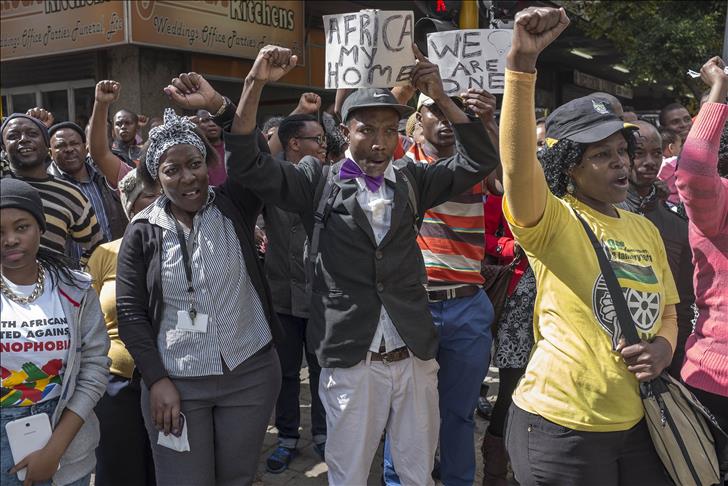
By Hassan Isilow
JOHANNESBURG
Bakari Rajab, a 47-year-old tailor from Malawi, says it will take him a long time to come to terms with the anti-immigrant violence that has swept through South Africa in recent weeks and cost him everything he has.
"I was at home when I heard a loud bang on my neighbor's door," Rajab told The Anadolu Agency at a temporary refugee camp in Mayfair, a Johannesburg suburb.
"When I opened my door to check, I saw men with clubs and machetes approaching my house," he recalled.
Rajab, a father of seven who has lived in South Africa for two years, decided immediately to run for his life.
"I am still traumatized," he said bitterly. "They took all my money and tailoring machines."
South Africa has seen increasing anti-immigrant violence in recent weeks that has mostly targeted migrants from other African countries.
The violence began earlier this month in Durban, where mobs descended on the homes and shops of a number of foreign migrants.
The victims were accused of stealing jobs from native South Africans, committing crimes, and putting a burden on the country's social services.
At least seven people, including two Malawians, have so far been killed in the violence, which has since spread to parts of Johannesburg, South Africa’s largest city.
The violence has forced scores of migrants from Malawi, Mozambique, Zimbabwe and other African countries to leave South Africa.
"I am scared I might die if I continue living here," said a visibly shaken Rajab, surrounded by other displaced migrants.
"I want to go home," he said.
The Malawian government has hired buses in South Africa to repatriate nationals fleeing the violence.
A total of 390 Malawian attack survivors arrived home late Monday.
Some 3,200 Malawians in South Africa have reportedly been affected by the recent spate of attacks.
Hundreds of Malawians travel to South Africa each year in search of employment.
Rajab used to support his wife and pay his children's school fees with money made from his tailoring business.
"I will find something else to do in Malawi to support my family," he told AA.
The South African government apologized to African countries – and the world – following the attacks, which have tainted the image of the "rainbow nation."
The government deployed the army on Tuesday to help police quell the anti-immigrant violence.
Hiding
Adam Mustafa, a 21-year-old Malawian, used to work as a laborer at a Chinese warehouse in Durban before the violence broke out.
"They took my three phones and 2,500 rand [approximately $220], which I had left at the house," he told AA tearfully.
Mustafa survived the anti-immigrant attacks by hiding in a nearby bush until the marauding mobs left the area.
"I thought they would find us and hack us to death with their machetes and clubs," he said. "But God saved us."
Although he used to earn good money, much of which went to helping his parents and siblings back home, Mustafa says he won't risk staying any longer in South Africa.
"There are fewer opportunities back in Malawi, but at least it's safe there," he told AA. "If people dislike you, it's better to leave."
Hundreds of thousands of African migrants currently live in South Africa, the majority of whom are involved in the informal business sector.
They have been the most affected by the recent disturbances, with their shops and homes often being looted whenever there are service delivery protests.
Seven years ago, more than 50 African migrants were killed across the country by mobs of angry South Africans.
Staying
There are dozens of displaced migrants currently staying at the temporary camp, which was set up by the Gift of the Givers Foundation, a humanitarian organization devoted to helping vulnerable migrants.
"A group of South Africans came to our house at night demanding to see our identification documents," Lindiwe Ndlovu, a 26-year-old mother of three from Zimbabwe, told AA.
"When they found out we were not citizens, they chased us away," she recalled.
But, unlike many others, Ndlovu said they would not return to Zimbabwe because her husband had a good job in South Africa.
"We are going to wait until the situation calms down before we return to Alexandra," she said, referring to the Johannesburg township where they live.
Mohammed Yare, a 37-year-old Somali migrant, was inside his Durban shop when he heard the sound of a large crowd approaching.
"I came out and saw a group of men with clubs and machetes about 50 meters from my shop," he told AA. "I knew immediately they had come to loot my shop."
Yare says he had no choice but to run for his life.
"I knew if I remained in the shop, they would kill me," he added.
Yare jumped over a fence while a sympathetic neighbor hid him in his home until the angry mob was done looting his shop.
"I lost over 100,000 rand [approximately $10,000] in a matter of minutes," he cried.
The Somali trader, who has lived in South Africa for the past decade, said it took him years of hard work to build his business from scratch.
"It will be hard to forget this day," he lamented.
Nevertheless, Yare has no plans to go back to his native Somalia.
"I will go back to Durban when calm is restored," he told AA. "I have to earn a living; I have dependents."
His relatives in Johannesburg have promised to help him with some cash to restart his business once the anti-immigrant violence has subsided.
"I get very angry when I remember what happened," Yare told AA. "But there's nothing to do but move on."
Anadolu Agency website contains only a portion of the news stories offered to subscribers in the AA News Broadcasting System (HAS), and in summarized form. Please contact us for subscription options.







